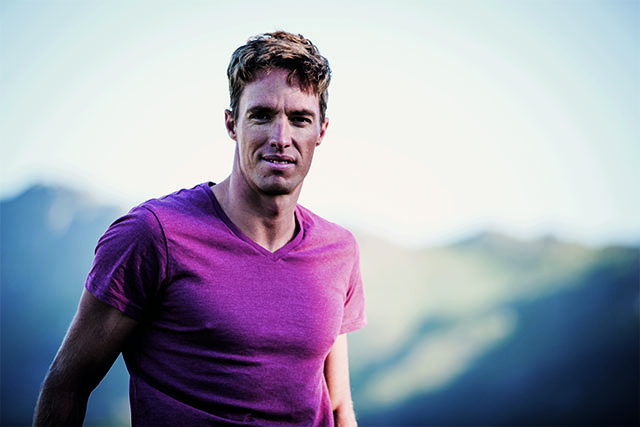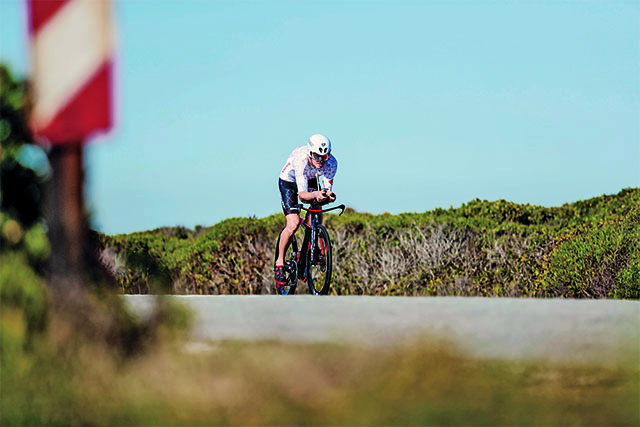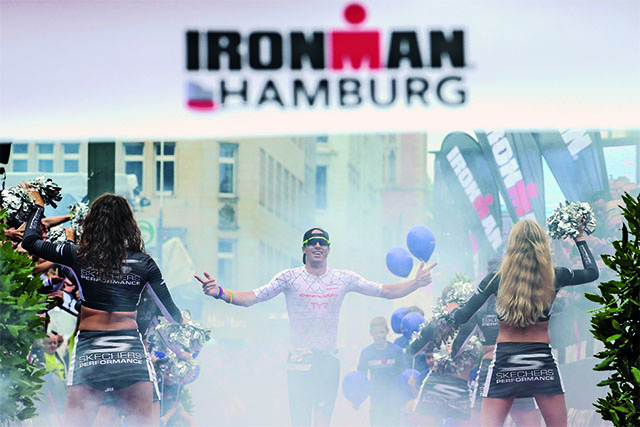The Runner Guy: Ironman Superstar James Cunnama
South Africa’s James Cunnama is one of the world’s top Ironman-distance triathletes, with the ability to pull off sensational run splits. Here are his secrets… – By RW Editor, Mike Finch

James Cunnama is no stranger to the podium in long-distance triathlon. Multiple top-three finishes and wins – along with a fourth place at the Big Daddy of them all, the Ironman World Champs in Hawaii (in 2013) – have turned the former Port Elizabeth wannabe into a global multi-discipline force.
But it’s his astonishing running ability that has made him one of the most lethal finishers in the sport. At the recent Hamburg Ironman, the 34-year-old from Stellenbosch pulled off one of the fastest run splits to take the overall win.
After completing the 3 800m swim in 49 minutes, and a windy and hilly 180km bike leg in 4 hours 24 minutes, Cunnama destroyed the rest of the field with a marathon run split of 2 hours, 40 minutes, 58 seconds – one of the fastest Ironman run splits ever recorded.
A 2:40 marathon, at the end of a 3.8km swim and a tough, windy 180km bike ride? How the hell did you do that?
It wasn’t easy, that’s for sure – even if it looked like it was. I’ve been building my strength all year, working on some specific areas my coach and I identified as factors that may be hindering my run.
I think a 2:40 marathon isn’t too difficult, for someone with my running pedigree. But being able to do it after a 3.8km swim and 180km bike is the challenge, of course. Looks like we may have figured out how best to do that!
Now to do it in every Ironman I enter…
You’re back with Brett Sutton, your coach from a few years back, who seems to have got your running back on track. What’s he changed?
Much has changed since going back to him. One of the biggest differences is simply leaving all the thinking to Brett. I just get on with the hard work – something I missed, during the years without him guiding me. Too much thinking and analysis.
Specifically, we’ve been working on my bike leg. No matter how good a runner you are, if your legs are jelly after the bike you won’t run well in an Ironman.
The running leg in a triathlon is often the toughest. How do you train for a tri run? Particularly a long run, like a marathon?
We do a lot of long runs. I did Ironman Frankfurt and Ironman Hamburg five weeks apart, and in the time between I ran a few long runs, including one full marathon in training. That’s three full marathons in five weeks!
But Ironman running isn’t really like straight running races. In a normal marathon, you get tired and hit the wall at 28 to 32km; but in an Ironman, you get tired about an hour before you even start the marathon (if you’re lucky), so we train specifically to run well when tired – not necessarily just to run a good marathon. This applies to all triathlons, of course.
During Hamburg IM, most of the Germans expected you to blow up during the bike leg, but you didn’t – what’s the secret?
Like I say, we’ve been working hard on the bike. In fact, despite the 2:40 marathon, my bike leg’s the one I was most happy with in Hamburg. The bike leg anchors your whole day in an Ironman – it can set you up to run for the win, or it can cost you so much energy, you can’t run at all.
A lot of miles, especially in the high mountains around St. Moritz – that’s starting to pay dividends in my bike strength.

You’ve always been a great runner, but there’s an age-old triathlon question: work on your weaknesses, or work on your strengths?
Work on your weaknesses. Race to your strengths.
It depends somewhat on what your strengths and weaknesses are, as a triathlon is swim, then bike, then run. No matter how good you are at running, or how much you work on it, you won’t be in it if you can’t swim and bike well.
Of course, if you’re a super swimmer you should probably work on your run; as no matter how much lead you have when you get out of the water, the runners will run you down on the last leg.
What specific run sessions do you do?
We do a wide variety, from short, sharp 200m intervals on the track, to lots of steady 800m intervals, up to marathon long runs. We also do a lot of ‘build’ runs, picking up the pace and effort as fatigue sets in, which is what an Ironman requires.
Mileage? Swim, bike and run?
It varies greatly, with big bike weeks, big run weeks and easier weeks; but I’d say on average throughout the season I swim 20-25km a week, bike 500-600km a week, and run 70-100km a week.
We interviewed you a few years ago, and you told us you never use a watch during the run – you run on feel. Is that still the case?
That is still the case – I never wore a watch at Ironman Hamburg. Perhaps that’s why I missed a sub-2:40 run by 58 seconds, and sub-8 hours by 36 seconds…
But it’s not about times – they’re just nice to look at after a good day. I don’t feel a watch helps much in an Ironman marathon, as after a few kays, you’re just running as well as you can – your body and training determine your pace. Your focus needs to be internal, not on some ideal number you set in your head before the start.

Have you ever run a marathon on its own? How did you do? Surely you were faster?
I’ve only run two straight marathons (in races – I’ve run lots in training!). Both of them were done more as training days than tests, and both were around the 2:40 mark. Technically, my marathon PB is from an Ironman.
I’d like to run one properly soon, and give it a good go. Maybe this off-season. Sub-2:30? Faster? I’ll let you know…
Do you ever think: ‘If I just focused on running, I could…’?
I think, ‘If I just focused on running I could… not keep up with the Kenyans’.
Not even for a minute. I run well, but my particular run strengths and body shape are more suited to the challenges of Ironman than straight running.
What keeps you motivated, during the ups and downs of triathlon life?
I enjoy my triathlon. But I’ve had some ups and downs, where motivation is difficult. I find the best way to move through those periods is to get out the door, and do what you like. If the thought of a certain session makes you dread it, then do something you look forward to. But always get out the door.
It’s amazing how often your mind can convince you that a session will be terrible, and you should stay on the couch – and then you start it, and it’s great.

What’s next? World’s, in Kona? Rumour has it you’re planning to run a strong marathon there too. Is winning overall a goal, or a top three?
Ironman World Champs is the next big goal. I’ll do a couple of Ironman 70.3 races en route to Kona (Lanzarote and Weymouth), but those are just sharpeners, and training.
I haven’t really set a specific goal for Kona 2017. Of course I’d like to run well; and if I can, I don’t see why I can’t make the top five, especially given my recent form in Hamburg.*
However, my real goal is Kona 2018. My coach and I sat down and worked out a plan to challenge for the win at Ironman World Champs; and decided that realistically, that needs more time than Kona 2017 gives us.
But I’m in good form, maybe my best ever – so who knows what’s possible at Kona 2017…
** James Cunnama placed fifth in the recent IRONMAN World Championship which took place on 14 October in Kailua-Kona, Hawaii.
READ MORE ON: ironman James Cunnama triathlon

